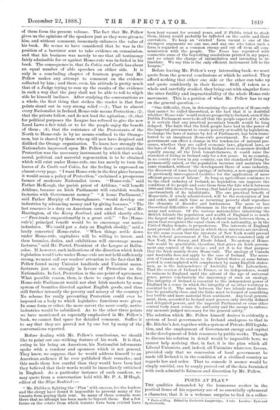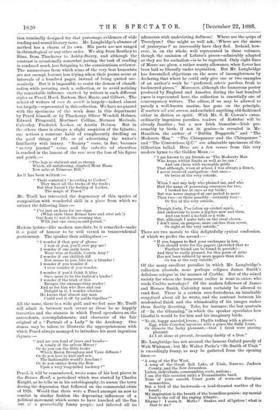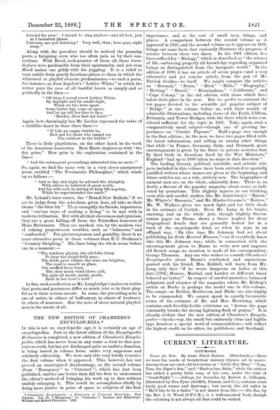POETS AT PLAY.*
THE qualities demanded by the humorous reciter in the poetical items of his repertory are of so essentially ephemeral a character, that it is a welcome surprise to find. in a collec- • Poets at Play. Edited by Frederick Langbridge. 2 vole. London : Eyre and Spottewoode.
tion nominally designed for that personage, evidences of wide reading and sound literary taste. Mr. Langbridge's absence of method has a charm of its own. His poets are not ranged in chronological or any other order. We skip from Southey to Sims, from Thackeray to Ashby-Sterry, and although the contrast is occasionally somewhat jarring, the task of reading is rendered much less fatiguing to the conscientious reviewer.
The mannerisms from which some of the very best humorists are not exempt, become less trying when their poems occur at intervals of a hundred pages, instead of being quoted suc- cessively. But it is impossible to resist the demon of classifi- cation while perusing such a collection, or to avoid noticing the remarkable influence exerted by writers in such different styles as Freed, Hood, Barham, Bret Barth, and Gilbert. The school of writers of vers de sociN is largely—indeed, almost too largely—represented in this collection. We have no quarrel with the specimens of the work done in this department by Praed himself, or by Thackeray, Oliver Wendell Holmes, Edward Fitzgerald, Mortimer Collins, Herman Merivale,
Calverley, Frederick Locker, or Austin Dobson. But in the others there is always a slight suspicion of the falsetto ; one notices a constant habit of complacently dwelling on the good things of life, or of advertising the writer's
familiarity with luxury. " Society " verse, in fine, becomes "society journal" verse, and the reductio ad absurdum is reached in the lament of the roué over the loss of his figure and youth :—
"The legs so stalwart and so strong
Which, all unfaltering, climbed Mont Blanc Now ache at Primrose Hill."
As it has been written :— "Their scansion's according to Cocker,' They know all the tricks of the trade ; But they haven't the feeling of Locker, The magic of Praed."
Mr. Traill has travestied the degeneracy of this species of
composition with wonderful skill in a piece from which we extract the following lines :— " I've just an hour for one cigar (What style these Reinas have and what ash!)
One hour to watch the evening star, With just one cura.coa-and-potash."
Modern lyrists—like modern novelists, be it remarked—make it a point of honour to be well versed in transcendental gastronomy. The speaker then soliloquises :—
"I wonder if that pair of gloves
I won of you, you'll ever pay me !
I wonder if our early loves Were wise or foolish, Cousin Amy ?
I wonder if our childish tiff Now seems to you, like me, a blunder !
I wonder if you wonder if I ever wonder if you wonder.
I wonder if you'd think it bliss Once more to be the fashion's leader ! I wonder if the trick of this Escapes the unsuspecting reader ! And as for him who does and can Delight in it, I wonder whether He knows that almost any man Could reel it off by yards together !"
All the same, there is a wide gulf, and we feel sure Mr. Trail will admit it, between such verses as those he so happily
travesties and the stanzas in which Praed speculates on the antecedents, accomplishments, And character of the fair original of a "Portrait of a Lady" in the Academy. One stanza may be taken, to illustrate the appropriateness with which Praed always managed to introduce his most ingenious rhymes :—
"And are you fond of lanes and brooks— A votary of the sylvan Muses ?
Or do you con the little books Which Baron Brougham and Vaux diffuses ?
Or do you love to knit and sew, The fashionable world's Arachne ?
Or do you canter down the Row Upon a very long-tailed hackney ?"
Praed, it will be remembered, wrote some of his best pieces in the Brazen Head, a periodical which was started by Charles
Knight, as he tells us in his autobiography, to amuse the town during the depression that followed on the commercial crisis of 1826. Would that there were a Praed amongst us now to combat in similar fashion the depressing influences of a political movement which seems to have knocked all the fun out co!: a proverbially funny people, and infected all its
advocates with undeviating dullness! Where are the quips of Trevelyan ? One might as well ask, Where are the snows of yesteryear ?' so irrevocably have they fled. Ireland, how- ever, is, on the whole, well represented in these volumes, though the omission of Lefanu's pieces—admirably adapted as they are for recitation—is to be regretted. Only eight lines of Moore are given, a rather scanty allowance, when Lover has been laid so liberally under requisition. But Mr. Langbridge has forestalled objections on the score of incompleteness by declaring that where he could only give one or two examples of an author's work he "preferred, ceteris paribus, fresh to hackneyed pieces." Moreover, although the humorous poetry produced by England and America during the last hundred years is represented here, the collection is essentially one of contemporary writers. The editor, if we may be allowed to parody a well-known maxim, has gone on the principle, E mortuis nil nisi novum, and excluded anything old-fashioned either in diction or spirit. With Mr. S. K. Cowan's extra- ordinarily ingenious parodies, readers of Kottabos will be already familiar ; but a new Irish humorist—Irish pre- sumably by birth, if not in genius—is revealed in Mr. Hamilton, the author of "Dublin Doggerels" and "The Moderate Man" "The Chimpanzor and the Chimpanzee" and "The Contentious Q.C." are admirable specimens of the Gilbertian ballad. Here are a few verses from this very modern hymn to the Golden Mean :— "I am known to my friends as The Moderate Man Who keeps within limits as well as he can :'
And can claim with excusable pride That although, when at school, I was always a dunce, I never received castigation—but once— Or twice at the very outside.
When I met any lady who pleased me, and who Had the name of possessing resources for two, I booked her at once as my bride; But was never engaged at one period to more Than two—or three possibly—certainly four— Or five at the very outside.
Though forty, I've taken up cricket again, And endeavour to score a leg-bye now and then, And can bowl a no-ball or a wide.
But, although I make bets on the rival eleven, I don't miss, on purpose, more catches than seven, Or eight at the very outside."
There are two morals to this delightfully cynical confession, of which we prefer the second :— "If you happen to find your exchequer is low, You should write for the papers (provided that no Further friend can be found to provide) : And they're easily pleased, for this poem of mine Has not been refused by more papers than nine, Or ten at the very outside."
Of the many excellent parodies in which Mr. Langbridge's collection abounds, none perhaps eclipses James Smith's delicious eclogue in the manner of Crabbe. But of the mixed society for whom the humorous reciter is wont to cater, who reads Crabbe nowadays ? Of the modern followers of James and Horace Smith, Calverley must certainly be allowed to rank first. There is a certain sure-footedness, an inimitable sang-froid about all he wrote, and the contrast between his academical finish and the whimsicality of his images makes them doubly diverting. Take, for instance, the last quatrain of "In the Gloaming," in which the speaker speculates how blissful it would be for him and his imaginary bride.
"To sit, happy marriedlovers ; Phyllis trifling with a plover's Egg, while Corydon uncovers with a grace the Sally Lunn, Or dissects the lucky pheasant,—that I think were passing pleasant
As I sit alone at present, dreaming darkly of a Dun."
Mr. Langbridge has not secured the famous Oxford parody of Walt Whitman ; but Mr. Walter Parke's "St. Smith of Utah" is exceedingly funny, as may be gathered from the opening lines :—
"A song of the Far West,
A song of the Great Salt Lake, of Utah, Nauvoo, Jackson
County, and the New Jerusalem. Listen, individuals, communities, sects, nations ; I am (for this occasion only) a Transatlantic bard, None of your smooth Court poets of worn-out Europian monarchies, But a bird of the backwoods—a loud-throated warbler of the forest; My inspiration is the breath of the boundless prairie : my mental food is the roll of the raging Atlantic.
Rhyme ? I scorn it. Metre ? Snakes and alligators ! what is that to ICE? Libertad for ever ! I intend to sing anyhow—and all how, just as I tarnation please. Universe, are you listening ? Very well, then; here goes, right away."
Along with the parodists should be noticed the punning poets, a fatiguing crew, who too often pain us by their con- tortions. With Hood, arch-punster of them all, these tours- de-force were pardonable from their spontaneity, and yet even Hood makes one giddy with his juggling. It is a relief to turn awhile from purely facetious pieces to those in which the whimsical or playful element predominates,—to such a poem, for instance, as Jean Ingelow's " Lettice White," in which the writer puts the case of all bashful lovers so simply and so pointedly in the lines :— " Oft have I wooed sweet Lettice White, By daylight and by candle-light, When we two were apart. Some better day, come on apace, And let me tell her face to face, Maiden, thou bast my heart.' " Again, how charmingly has Mr. Locker expressed the value of a childlike heart in these three lines !— " If Life an empty bubble be, How sad for those who cannot see The rainbow in the bubble !"
There is little playfulness, on the other hand, in the work of the American humorists. Bret Harts inspires us with "the dry grins." How grim is the euphemism contained in the line- " And the subsequent proceedings interested him no more !" So, again, we find the same vein in a very clever anonymous poem, entitled "The Pessimistic Philosopher," which winds up as follows :— " And so day and night he advised the Almighty With advice he believed of great worth, And his wife took in sewing to keep life a-going, While he superintended the earth."
Mr. Leland's later verses, the "Brand-New Ballads," if we are to judge from the selections given here, all take as their theme "the biter bit." They exemplify the frauds, impostures, and " cur'ous ways of making a living" to be met with in modern civilisation. But with all their cleverness and cynicism, they are a great falling-off from the Falstaffian humours of Hans Breitmaun. They are marked, too, by the modern vice of coining preposterous vocable,s, such as " balmeous " and " confuseled." For picturesqueness and geniality, there is no more attractive poem in these volumes than E. C. Stedman's "Country Sleighing." His lines bring the whole scene before one in a moment :— " The windows glisten, the old folks listen To hear the sleigh-bells pass ; The fields grow whiter, the stars are brighter, The road is smooth as glass.
Our muffled faces burn, The clear north wind blows cold, The girls all nestle, nestle, nestle, Each in her lover's hold."
In fine, such a collection as Mr. Langbridge's makes us realise that poets and poetasters differ as much inter se in their play- ful as in their serious moods. In some, the prevailing note is one of satire, in others of buffoonery, in others of bonhomie, in others of nonsense. But the note of sheer natural playful- ness is the rarest of all.












































 Previous page
Previous page